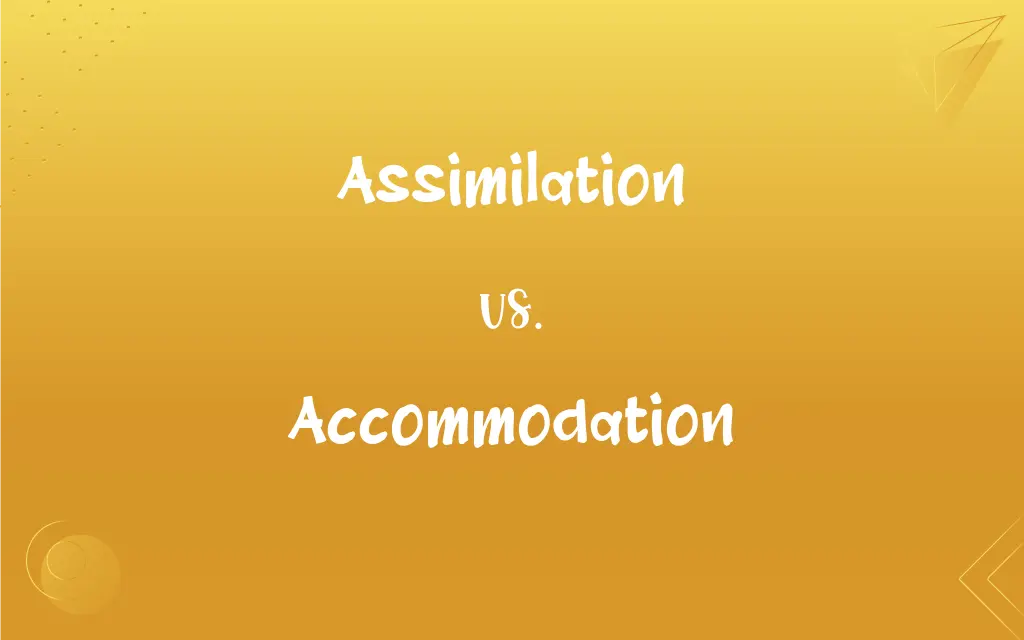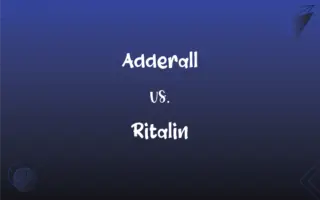Assimilation vs. Accommodation: What's the Difference?
Edited by Aimie Carlson || By Harlon Moss || Updated on October 4, 2023
Assimilation integrates new experiences into existing schemas; accommodation modifies existing schemas to fit new experiences.

Key Differences
Assimilation is a cognitive process where individuals incorporate new information into their existing mental structures or schemas. On the contrary, accommodation refers to the process of adjusting or altering one's existing schemas or ideas in response to new information. Both assimilation and accommodation are integral parts of Jean Piaget's theory of cognitive development, emphasizing how individuals perceive, process, and adapt to new information.
In the realm of assimilation, new experiences or data are integrated without changing the pre-existing structures. For instance, a child who has a schema for dogs might assimilate a new encounter with a cat by calling it a "dog" since both are four-legged pets. Accommodation, however, requires change. Using the previous example, when the child realizes that cats are distinct from dogs, they modify their existing schema to accommodate this new understanding.
Another way to look at assimilation is as a form of "adding" to what you already know without changing the structure of that knowledge. For example, learning about a new kind of apple would be assimilated into your existing understanding of apples. Accommodation, in contrast, is more transformative. If you encountered a fruit you'd never seen before and didn't fit your understanding of any known fruits, you'd need to accommodate your schema to include this new category.
Assimilation can be visualized as seamlessly integrating pieces into a puzzle where they fit without forcing them. The puzzle's overall picture doesn't change, just becomes more complete. Accommodation would be like realizing you're not just building one puzzle, but several interconnected ones, requiring a change in approach and understanding to fit pieces in their rightful places.
Comparison Chart
Definition
Incorporating new experiences into existing mental structures.
Adjusting or altering existing schemas for new experiences.
ADVERTISEMENT
Cognitive Aspect
Adds to existing schema without altering it.
Modifies or creates new schema.
Example
Seeing a new type of bird and calling it a "bird".
Realizing bats aren't "birds" and creating a new category for them.
Outcome
Broadens understanding within existing categories.
Expands or changes categories of understanding.
Adaptability
Static approach to new information.
Dynamic, evolving approach to new information.
Assimilation and Accommodation Definitions
Assimilation
Assimilation is the integration of new experiences into existing mental structures.
Seeing a zebra for the first time, a child calls it a horse due to assimilation.
ADVERTISEMENT
Accommodation
Accommodation involves creating new categories or adjusting old ones for better understanding.
Discovering that some plants eat insects, you create a new category for carnivorous plants.
Assimilation
Assimilation is fitting new data into pre-existing cognitive frameworks.
Discovering a new genre of music, you still label it under music due to assimilation.
Accommodation
Accommodation is modifying existing schemas to fit new experiences.
Realizing that not all flying creatures are birds, you adjust your schema to include bats.
Assimilation
Assimilation enriches existing categories without modifying them.
Learning about various trees, they all get classified as trees.
Accommodation
Accommodation is the restructuring of prior knowledge in light of new information.
After learning about marine mammals, you stop calling dolphins fish.
Assimilation
Assimilation is absorbing new experiences within current boundaries of knowledge.
Upon trying inline skates, a child deems them like shoes through assimilation.
Accommodation
Accommodation is adapting the mind's framework to align with novel discoveries.
After realizing Pluto isn't a planet like others, you adjust your schema of planets.
Assimilation
Assimilation is adapting new information without changing existing schemas.
After tasting a new dessert, you categorize it as sweet based on previous experiences.
Accommodation
Accommodation reshapes cognitive structures to incorporate unique experiences.
Learning about the distinction between viruses and bacteria demands an accommodation in understanding.
Assimilation
The act or process of assimilating.
Accommodation
The act of accommodating or the state of being accommodated; adjustment.
Assimilation
The state of being assimilated.
Accommodation
Something that meets a need; a convenience.
Assimilation
(Physiology) The conversion of nutriments into living tissue; constructive metabolism.
Accommodation
Room and board; lodgings.
Assimilation
(Linguistics) The process by which a sound is modified so that it becomes similar or identical to an adjacent or nearby sound. For example, the prefix in- becomes im- in impossible by assimilation to the labial p of possible.
Accommodation
A seat, compartment, or room on a public vehicle.
FAQs
How does assimilation relate to existing knowledge?
Assimilation adds to existing knowledge without altering its structure.
How does accommodation change our understanding?
It reshapes or creates new mental categories for a better fit with new experiences.
What is assimilation?
Assimilation is integrating new experiences into existing mental structures.
What's an example of assimilation in learning?
Calling all four-legged animals "dogs" based on an existing schema.
What is accommodation?
Accommodation is adjusting or altering existing schemas to fit new experiences.
Who introduced the concepts of assimilation and accommodation?
Jean Piaget, in his theory of cognitive development.
Can adults also undergo assimilation and accommodation?
Yes, these processes occur throughout life as we encounter new information and experiences.
Are assimilation and accommodation opposing processes?
No, they work together to help individuals process and adapt to new information.
Can assimilation occur without accommodation?
Yes, especially when new experiences align with pre-existing schemas.
Is accommodation always about creating new schemas?
No, it can involve modifying existing schemas as well.
Is assimilation a passive process?
It's relatively passive compared to accommodation as it doesn't change existing mental structures.
How do assimilation and accommodation contribute to learning?
They help individuals integrate new experiences and adjust their understanding of the world.
How do assimilation and accommodation impact child development?
They influence how children perceive, process, and adapt to new experiences.
Does accommodation require more cognitive effort?
Typically, yes, as it involves restructuring or modifying mental schemas.
Can accommodation lead to misconceptions?
If not followed by proper assimilation, misconceptions can arise.
How can educators encourage accommodation?
By introducing challenging material that requires students to reshape their understanding.
Is assimilation about conformity?
Not necessarily; in cognitive terms, it's about fitting new experiences into existing frameworks.
What's an example of accommodation in learning?
Realizing that whales aren't fish and adjusting one's understanding of marine life.
Why are assimilation and accommodation crucial in education?
They help educators understand how students process and adapt to new information.
How can teachers promote assimilation?
By providing examples that fit into students' existing knowledge.
About Author
Written by
Harlon MossHarlon is a seasoned quality moderator and accomplished content writer for Difference Wiki. An alumnus of the prestigious University of California, he earned his degree in Computer Science. Leveraging his academic background, Harlon brings a meticulous and informed perspective to his work, ensuring content accuracy and excellence.
Edited by
Aimie CarlsonAimie Carlson, holding a master's degree in English literature, is a fervent English language enthusiast. She lends her writing talents to Difference Wiki, a prominent website that specializes in comparisons, offering readers insightful analyses that both captivate and inform.































































